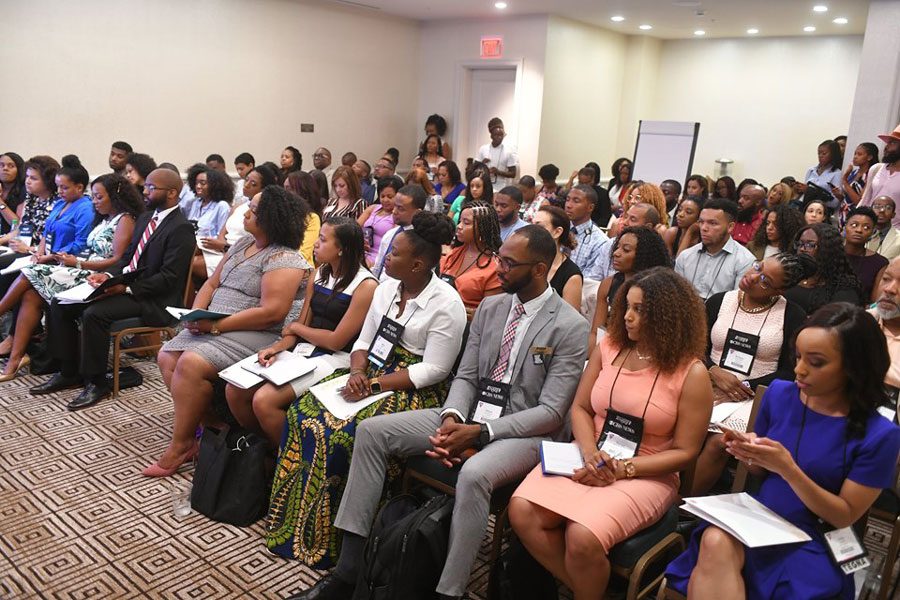Student journalists of color say summer conferences helped connect them with job opportunities
Source: National Association of Black Journalists Facebook
Attendees at the National Association of Black Journalists conference in Miami. Student journalists of color said their experience at summer conferences like NABJ, NAHJ and AAJA was invaluable.
October 1, 2019
Growing up, Rupa Palla said she didn’t come across many journalists who looked like her. Palla, who aspires to be a morning anchor, said the lack of Indian broadcast journalists she watched was disheartening and discouraging.
But after attending the Asian American Journalists Association National Convention in Atlanta and meeting other Indian people in the media, the Medill junior said she felt reinvigorated to pursue her chosen field.
“I really wanted to go to understand how other Asian Americans were able to forge that path for themselves and be successful in the journalism industry,” she said. “It was great to be surrounded by people who went against those stereotypes and did what they love instead.”
Medill career advisor Fiona Sykes said more than 20 Medill students attended national conventions organized by the AAJA, the National Association of Black Journalists and the National Association of Hispanic Journalists this summer. These conventions can connect journalists of color to internship and job opportunities, offer a slate of workshops and panels and promote diversity in newsrooms.
Outside of affinity conferences, journalism is an overwhelmingly white, male, heterosexual and cis-gender industry: More than three-quarters of newsroom employees in the U.S. are white, and over three-fifths are men, according to a Pew Research Center analysis of U.S. Census Bureau data. Although 40 percent of national newsrooms improved in racial diversity over the past two decades, journalists of color remain underrepresented in journalism jobs, coverage and media leadership.
Medill junior Cayla Clements, who’s a member of NABJ’s chapter at Northwestern, attended the NABJ Convention & Career Fair in Miami this August. She said hearing from successful black journalists like Caitlin Dickerson, who covers immigration for the New York Times, gave her confidence to pursue social justice reporting.
“It was inspiring and affirming to see such accomplished people in the field of journalism,” Clements said. “It was great to see people show their workplace that they are just as capable as everyone else there.”
Medill covered travel, lodging and registration expenses for student leaders in NU’s chapters of the AAJA, NABJ and NAHJ, Sykes said. Former Medill Dean Brad Hamm created a discretionary fund — which first went into effect in summer 2013 — to expand access to affinity conferences. Since 2016, Medill has more than tripled spending for these events.
Medill sophomore Wyatte Grantham-Philips attended the NAHJ Excellence in Journalism Conference in San Antonio, Texas. At first, presenting her resume was intimidating, but she said the career fair helped her fine-tune her networking skills.
Medill Professor Mei-Ling Hopgood is the faculty advisor for NU’s Asian American Student Journalists and NAHJ chapters. Hopgood, who has been an AAJA member since college, said she attributes her career success to her AAJA and NAHJ connections.
“Being able to go to these organizations and seeing people who had similar experiences on campuses when they were younger meant a lot,” she said. “Every job I’ve had as a journalist, and even this job, directly or indirectly can be traced to contacts I made in these organizations.”
But maintaining contacts after the conventions end can prove challenging, Palla said. She collected 30 business cards, but when she sent follow-up emails, she received only two responses.
Still, she said she’s grateful for the opportunity to meet other Asian American journalists.
“A lot of the time, for different minority groups, it’s hard to connect with other people’s journey in the news industry, and no journey is the same,” Palla said. “But if there’s a place where everyone shares one identity, you at least get a deeper understanding of how you get where you want to be.”
Email: [email protected]
Twitter: @herscowitz


